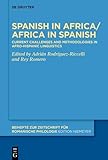Spanish in Africa/Africa in Spanish : Current challenges and methodologies in Afro-Hispanic linguistics / ed. by Adrián Rodríguez-Riccelli, Rey Romero.
Material type: TextSeries: Beihefte zur Zeitschrift für romanische Philologie ; 489Publisher: Berlin ; Boston : De Gruyter, [2024]Copyright date: 2024Description: 1 online resource (V, 290 p.)Content type:
TextSeries: Beihefte zur Zeitschrift für romanische Philologie ; 489Publisher: Berlin ; Boston : De Gruyter, [2024]Copyright date: 2024Description: 1 online resource (V, 290 p.)Content type: - 9783111340647
- 9783111340692
- 9783111340678
- 462.496 23/eng/20240919
- PC4582.A3 S73 2024
- online - DeGruyter
- Issued also in print.
| Item type | Current library | Call number | URL | Status | Notes | Barcode | |
|---|---|---|---|---|---|---|---|
 eBook
eBook
|
Biblioteca "Angelicum" Pont. Univ. S.Tommaso d'Aquino Nuvola online | online - DeGruyter (Browse shelf(Opens below)) | Online access | Not for loan (Accesso limitato) | Accesso per gli utenti autorizzati / Access for authorized users | (dgr)9783111340678 |
Frontmatter -- Contents -- Afro-Hispanic linguistics. Challenges, misrepresentations, and assumptions -- An overview of recent research on the sociolinguistic role of Luso-Africans, ladino Africans, and criollos of African descent in the early colonial Spanish Americas -- Methodological choices and personal responsibility of researchers -- Afro-Puerto Rican Spanish declarative intonation -- San Andrean Spanish stylistic variation in academia -- Subject pronoun expression in Equatoguinean Spanish -- Issues of Spanish language maintenance among the Equatorial Guinean community in Houston -- Towards a social justice framework for marginalized linguistic communities -- Index
restricted access online access with authorization star
http://purl.org/coar/access_right/c_16ec
Since the 1960s, Afro-Hispanic linguistics has produced vital knowledge at the intersection of African diaspora studies and Spanish sociolinguistics – yet many misconceptions persist in research literature. To challenge those biased assumptions, the contributions gathered in this volume present current research on Afro-Hispanic varieties from both sides of the Atlantic (Equatorial Guinean Spanish, Palenquero, Afro-Puerto Rican Spanish from Loíza, San Andrean [Colombia] Raizal Spanish) and address the influence of Portuguese-based Creoles on Afro-Hispanic varieties during the early colonial era. Conceived in cooperation with students, activists, social workers, civil servants, and researchers who work with Afro-Hispanic languages and communities (as well as with other languages and communities who suffer linguistic, social, and racial marginalization), this volume adopts a social justice framework that seeks tangible, material, and quality-of-life improvements for the speech communities in which it investigates. It includes best practices for empirical research, recruitment of respondents and informants, fieldwork and archival work, and pedagogical and community-facing applications of research.
Issued also in print.
Mode of access: Internet via World Wide Web.
In English.
Description based on online resource; title from PDF title page (publisher's Web site, viewed 20. Nov 2024)


